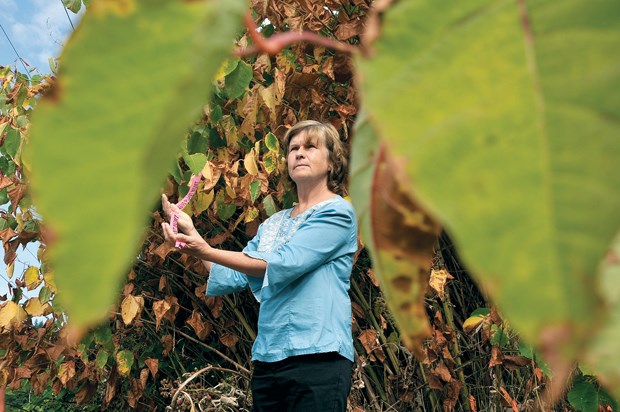Lynnmour residents say they were caught from the blind side this week when district-contracted crews used a herbicide to commit invasive species homicide.
Workers targeted swaths of Japanese knotweed in Inter River Park, leaving some outdoor enthusiasts wondering about the toxicity of newly ripe blackberries and the long-term health effects of glyphosate exposure. Eager to try a new blackberry cordial recipe, Elise Roberts ventured into the woods when she saw a sign warning of herbicide application. The sign is small, faded and vague, she said. "They do not say (glyphosate) is being sprayed, they say it's being applied," she said.
Lynnmour resident and blackberry picker Brenda Barrick said she overlooked the signs. "If they sprayed, I had no idea," she said. Barrick declined to pick this year's Inter River blackberries because of the spray.
Aghast at seeing children picking berries, Roberts registered her complaints only to be told the blackberries were safe. However, at least one sign on the site states: Do Not Eat Berries Found Near Treatment Site.
Eliminating knotweed in a safe way allows nature to "reboot itself," according to Invasive Species Council of Metro Vancouver project manager Jennifer Grenz. "Blackberries in the area are fine. We're not spraying the blackberries," she said.
Some municipalities including West Vancouver have banned spraying glyphosate, opting for stem injection. Stem injection uses 500 times more herbicide than spraying and is far less effective, according to Grenz, who says one of the flaws of stem injection is its nearinstant effect. "You actually want a slow death," Grenz explained. "If it kills too fast the product doesn't actually translocate right down to the end of the root, so you end up with live root fragments left in the soil that will give rise to more plants."
Spraying is only permitted when wind is calm and glyphosate can be controlled, according to Grenz. "You can see great examples where we spray one plant and the tree and plant beside it are alive and thriving," she said.
That's not the case at Inter River, according to Roberts. "There's a whole swath of blackberries right next to the knotweed that's all brown and dying."
Inter River Park is safe, according to Grenz. "You'd be more exposed to pesticides walking in a grocery store," she said, discussing glyphosate's prevalence in agriculture.
Failure to control a monoculture like Japanese knotweed can mean loss of wildlife habitat and disruption of spawning channels, according to Grenz. Spraying glyphosate helped rejuvenate formerly infested sites in Cates Park and Mosquito Creek, she said.
The knotweed problem is particularly acute in Inter River, which is used as a park storage area. If Japanese knotweed intermingles with gravel or sand, the species could be trucked to other district parks.
Roberts plans to ask mayor and council for a moratorium on the use of pesticides and herbicides in Lynnmour.



